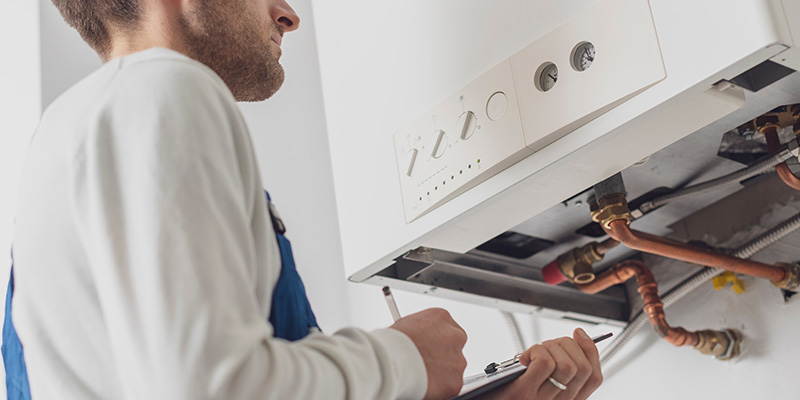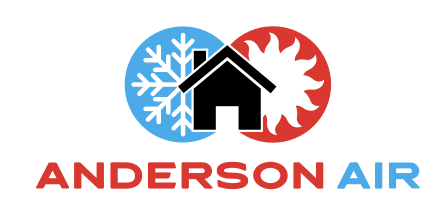Understanding and Preventing Common Winter HVAC Issues

If you’re not very familiar with HVAC systems, you’re in good company. Many homeowners encounter heating issues during the winter but aren’t sure how to tackle them effectively. We’ll guide you through understanding and preventing common winter HVAC issues. Our aim is to provide simple, straightforward advice that demystifies HVAC maintenance and helps you maintain a warm home throughout the colder months.
At Anderson Air, we’re committed to empowering our customers with knowledge. By grasping the basics of your HVAC system and learning a few preventive measures, you can avoid common problems and keep your system running smoothly.
Recognizing Common Winter HVAC Problems
Keeping your home warm and comfortable becomes a top priority as winter rolls in, but the colder weather often presents unique challenges for your HVAC system. Let’s explore some frequent problems you might face and how to spot them.
Frozen Pipes: Can HVAC Pipes Freeze?
In traditional HVAC systems, the term “pipes” isn’t typically used; instead, components like coils, refrigerant lines, or ductwork are more common. In the context of freezing:
Refrigerant Lines in Cold Weather
While refrigerant lines in your HVAC system don’t typically “freeze” in the way water pipes do, they can become very cold and may even frost over. The refrigerant inside these lines is designed to operate at low temperatures and doesn’t freeze under normal winter conditions.
This is normal to some extent, but excessive frosting might indicate a problem. Regular maintenance, including checks of refrigerant levels and system performance, can prevent these issues.
Evaporator Coils Icing Over
The evaporator coils in your HVAC system can ice over due to malfunctions or extremely low temperatures. This icing can hinder your system’s efficiency, leading to poor heating performance. Keep an eye out for ice buildup on these coils and ensure regular maintenance checks. If you notice ice on your evaporator coils, turning off the system and calling for professional service is advisable.
Dealing with Frozen Condensate Lines
Condensate lines can freeze if they have water in them and are exposed to freezing temperatures. This is more common in air conditioners during cold weather if the unit is still in use or not properly winterized.
Signs of a frozen condensate line include water leaks or a backed-up drainage. To prevent this, properly insulate these lines and consider professional winterization services. If you suspect your condensate lines are frozen, it’s best to contact a professional for safe and effective solutions.
So, while traditional HVAC systems don’t have “pipes” in the sense of water plumbing that can freeze, they do have components that can experience issues related to cold temperatures. The term “pipes freezing” in the context of HVAC might be a misunderstanding or a simplification of these other issues.
By understanding these winter-specific challenges and taking proactive steps, you can keep your HVAC system functioning efficiently throughout the colder months. Regular maintenance and timely professional assistance are key to addressing these issues effectively.
What to Do If Ice or Freezing Temperatures Affect Your HVAC System
When ice or extreme cold impacts your HVAC system, taking prompt and appropriate action is necessary to prevent further damage and make sure your home remains comfortable. Here are steps you can follow:
- Turn Off the Affected System: If you notice significant ice buildup or suspect freezing issues, the first step is to turn off the affected system. Continuing to operate it under these conditions can lead to more severe damage.
- Inspect for Visible Issues: Once safely turned off, inspect the system for visible signs of ice on the evaporator coils or the outdoor unit. Avoid using sharp objects or force to remove ice, as this can damage the components.
- Gently Thaw Affected Areas: If accessible and safe, you can gently thaw the affected areas using a hair dryer set on low heat. Keep the dryer moving to avoid concentrating heat in one spot, which could damage the system.
- Check and Replace Air Filters: Sometimes, ice buildup can be due to reduced airflow from clogged air filters. Check your filters and replace them if they are dirty. This simple step can sometimes resolve minor freezing issues.
- Seek Professional Help: If the issue is not resolved by these steps or you are unsure about any part of the process, call in the experts. HVAC professionals have the expertise to safely diagnose and repair issues caused by ice and freezing temperatures. They can also provide valuable advice on preventing future problems.
- Consider System Upgrades: If your system frequently has issues during cold weather, it might be time to consider an upgrade. Modern HVAC systems offer improved efficiency and better performance in extreme conditions.
Tackling Inconsistent Home Heating
Inconsistent heating in your home during winter can be frustrating. Some rooms might feel like a sauna, while others resemble a freezer. This issue could signal uneven heating, often due to blocked vents, dirty filters, or an aging HVAC system. Regular cleaning or changing of your filters can significantly improve this issue. For more complex challenges, professional HVAC services might be necessary to diagnose and fix uneven heating.
Diagnosing Uneven Heating
Uneven heating typically stems from a few common sources:
- Blocked or Closed Vents: Sometimes, furniture or drapes block vents, restricting airflow. Check to see whether all your vents are open and have clear paths for air to circulate.
- Dirty Air Filters: A clogged filter restricts airflow, leading to uneven heating. Regularly replacing or cleaning air filters can solve this problem.
- Ductwork Issues: Leaks or blockages in your ductwork can prevent heat from reaching certain areas. Inspecting and repairing ductwork can improve heat distribution.
Solutions for Even Heating
Once you’ve identified the cause of uneven heating, you can take steps to fix it:
- Rearrange Furniture: Ensure no large pieces of furniture block your vents. This simple rearrangement can significantly improve airflow and heating consistency.
- Regular Filter Maintenance: Replace or clean your HVAC filters every few months, or more frequently if you have pets or a dusty environment.
- Ductwork Inspection and Repair: Consider having your ductwork inspected by professionals who can identify and fix any leaks or blockages, ensuring efficient heat distribution.
- Upgrade to a Zoned Heating System: For larger homes or those with unique layouts, a zoned heating system installation allows you to control the temperature in different areas independently. This type of system can lead to significant comfort improvements and energy savings.
By addressing these common causes, you can enjoy a more evenly heated home during the winter months. Regular maintenance and professional inspections play a vital role in ensuring your heating system operates at its best.
Solving Winter Thermostat Problems
Navigating thermostat issues in winter is a common challenge for many homeowners. A properly functioning thermostat is vital for maintaining a comfortable temperature in your home.
Recognizing Thermostat Issues
Thermostat problems can manifest in various ways:
- Heating System Not Activating: If your heating system doesn’t start when the temperature drops, the thermostat might not be signaling correctly.
- Inconsistent Temperatures: If there’s a noticeable discrepancy between the set temperature and actual room temperature, your thermostat might need recalibration or replacement.
- Frequent Cycling: If your HVAC system turns on and off more frequently than usual, it could be due to incorrect thermostat settings or malfunction.
Steps to Address Thermostat Problems
Here’s what you can do to resolve these issues:
- Check and Replace Batteries: If your thermostat is battery-operated, replace the batteries first. This simple step can often resolve many common issues.
- Recalibrate or Reset the Thermostat: Consult your thermostat’s manual for instructions on recalibration or resetting. This can correct minor issues with temperature discrepancies.
- Clean the Thermostat: Dust and dirt inside the thermostat can affect its functionality. Carefully open the cover and gently clean the interior with a soft brush.
- Review and Adjust Settings: Check that your thermostat is set to ‘heat’ mode in winter and whether the programmed settings align with your current needs.
- Upgrade to a More Advanced Thermostat: If your thermostat is outdated, consider upgrading to a more advanced model. Modern thermostats offer better accuracy and features, like programmable settings and remote control.
- Consult with Professionals: If these steps don’t resolve the issue, it might be time to consult with HVAC professionals. Technicians can diagnose and fix complex thermostat issues to keep your system operating efficiently.
By effectively addressing thermostat issues, you can enhance the performance of your HVAC system and enjoy a more comfortable home during winter.
Frequently Asked Questions
Q: How Can I Prevent My HVAC System from Freezing in Winter?
A: To prevent freezing, ensure good air circulation and proper insulation of any exposed components. Regular maintenance, including checking and replacing air filters, is also important. If you have an outdoor unit, keep it clear of snow and ice.
Q: What Should I Do If My Home Has Uneven Heating?
A: Start by checking for blocked or closed vents and replacing dirty air filters. If these steps don’t resolve the issue, it may be worth having your ductwork inspected for leaks or blockages. In some cases, upgrading to a zoned heating system can provide more consistent heat distribution.
Q: How Do I Troubleshoot Thermostat Issues in Winter?
A: First, check if the thermostat batteries need replacing. If the problem persists, try recalibrating or resetting the thermostat according to the manufacturer’s instructions. If these steps don’t work, consider consulting a professional for a more thorough inspection or an upgrade.
Q: Should I Upgrade to a Smart Thermostat?
A: Upgrading to a smart thermostat can offer improved temperature control, energy efficiency, and convenience. These thermostats can adapt to your heating preferences and allow remote adjustments, which can be particularly useful in winter.
Q: How Often Should I Service My HVAC System for Winter?
A: It’s advisable to service your HVAC system at least once a year, ideally before the onset of winter. This service should include a thorough inspection, cleaning, and any necessary repairs or adjustments.
Q: Can I Turn Off My HVAC System If I’m Away During Winter?
A: While it’s okay to lower the thermostat setting when you’re away, completely turning off the HVAC system is not recommended. Keeping the system on at a lower setting prevents pipes from freezing and maintains a baseline level of warmth in your home.
Q: Why Is My HVAC System Running More Frequently in Cold Weather?
A: Increased running times can be due to several factors, including lower outdoor temperatures, poor insulation, or issues with the HVAC system itself. If your system is running excessively, it might be time for a maintenance check or an upgrade for better efficiency.
Stay Warm This Winter
A little knowledge and attention can go a long way in keeping your home comfortable during the colder months. From understanding how to prevent your system from freezing to managing uneven heating and thermostat issues, we’ve covered several important aspects to help you navigate the winter with ease.
While tackling some of these challenges might be within your DIY capabilities, remember that professional support is always available for those trickier situations. Regular maintenance checks and timely interventions by experts can save you time, trouble, and money while you keep your HVAC system running efficiently and reliably.
If you’re facing any HVAC concerns this winter or just want to make sure your system is in its best condition, our team at Anderson Air is ready to assist. For expert advice, maintenance services, or any HVAC inquiries, reach out to us, and let’s get your HVAC system ready for the cold weather ahead.
